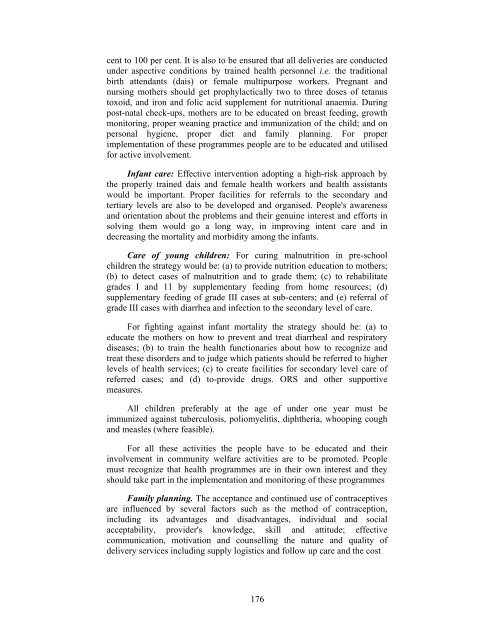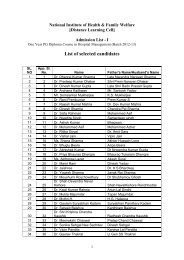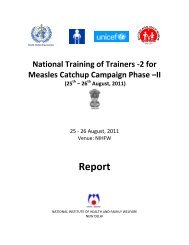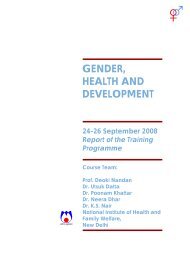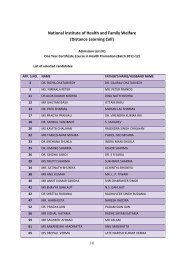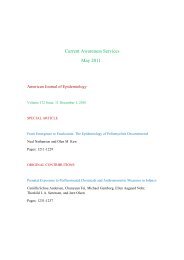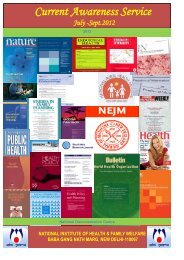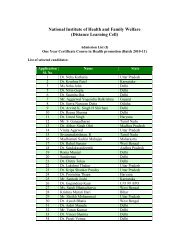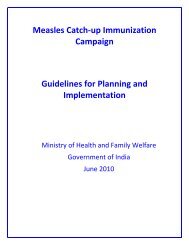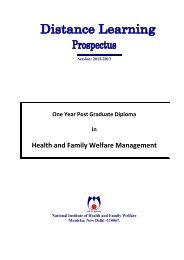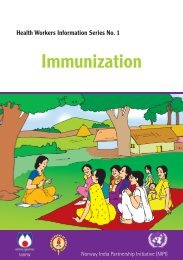COMMUNITY PARTICIPATION IN PRIMARY HEALTH CARE ...
COMMUNITY PARTICIPATION IN PRIMARY HEALTH CARE ...
COMMUNITY PARTICIPATION IN PRIMARY HEALTH CARE ...
Create successful ePaper yourself
Turn your PDF publications into a flip-book with our unique Google optimized e-Paper software.
cent to 100 per cent. It is also to be ensured that all deliveries are conducted<br />
under aspective conditions by trained health personnel i.e. the traditional<br />
birth attendants (dais) or female multipurpose workers. Pregnant and<br />
nursing mothers should get prophylactically two to three doses of tetanus<br />
toxoid, and iron and folic acid supplement for nutritional anaemia. During<br />
post-natal check-ups, mothers are to be educated on breast feeding, growth<br />
monitoring, proper weaning practice and immunization of the child; and on<br />
personal hygiene, proper diet and family planning. For proper<br />
implementation of these programmes people are to be educated and utilised<br />
for active involvement.<br />
Infant care: Effective intervention adopting a high-risk approach by<br />
the properly trained dais and female health workers and health assistants<br />
would be important. Proper facilities for referrals to the secondary and<br />
tertiary levels are also to be developed and organised. People's awareness<br />
and orientation about the problems and their genuine interest and efforts in<br />
solving them would go a long way, in improving intent care and in<br />
decreasing the mortality and morbidity among the infants.<br />
Care of young children: For curing malnutrition in pre-school<br />
children the strategy would be: (a) to provide nutrition education to mothers;<br />
(b) to detect cases of malnutrition and to grade them; (c) to rehabilitate<br />
grades I and 11 by supplementary feeding from home resources; (d)<br />
supplementary feeding of grade III cases at sub-centers; and (e) referral of<br />
grade III cases with diarrhea and infection to the secondary level of care.<br />
For fighting against infant mortality the strategy should be: (a) to<br />
educate the mothers on how to prevent and treat diarrheal and respiratory<br />
diseases; (b) to train the health functionaries about how to recognize and<br />
treat these disorders and to judge which patients should be referred to higher<br />
levels of health services; (c) to create facilities for secondary level care of<br />
referred cases; and (d) to-provide drugs. ORS and other supportive<br />
measures.<br />
All children preferably at the age of under one year must be<br />
immunized against tuberculosis, poliomyelitis, diphtheria, whooping cough<br />
and measles (where feasible).<br />
For all these activities the people have to be educated and their<br />
involvement in community welfare activities are to be promoted. People<br />
must recognize that health programmes are in their own interest and they<br />
should take part in the implementation and monitoring of these programmes<br />
Family planning. The acceptance and continued use of contraceptives<br />
are influenced by several factors such as the method of contraception,<br />
including its advantages and disadvantages, individual and social<br />
acceptability, provider's knowledge, skill and attitude; effective<br />
communication, motivation and counselling the nature and quality of<br />
delivery services including supply logistics and follow up care and the cost<br />
176


